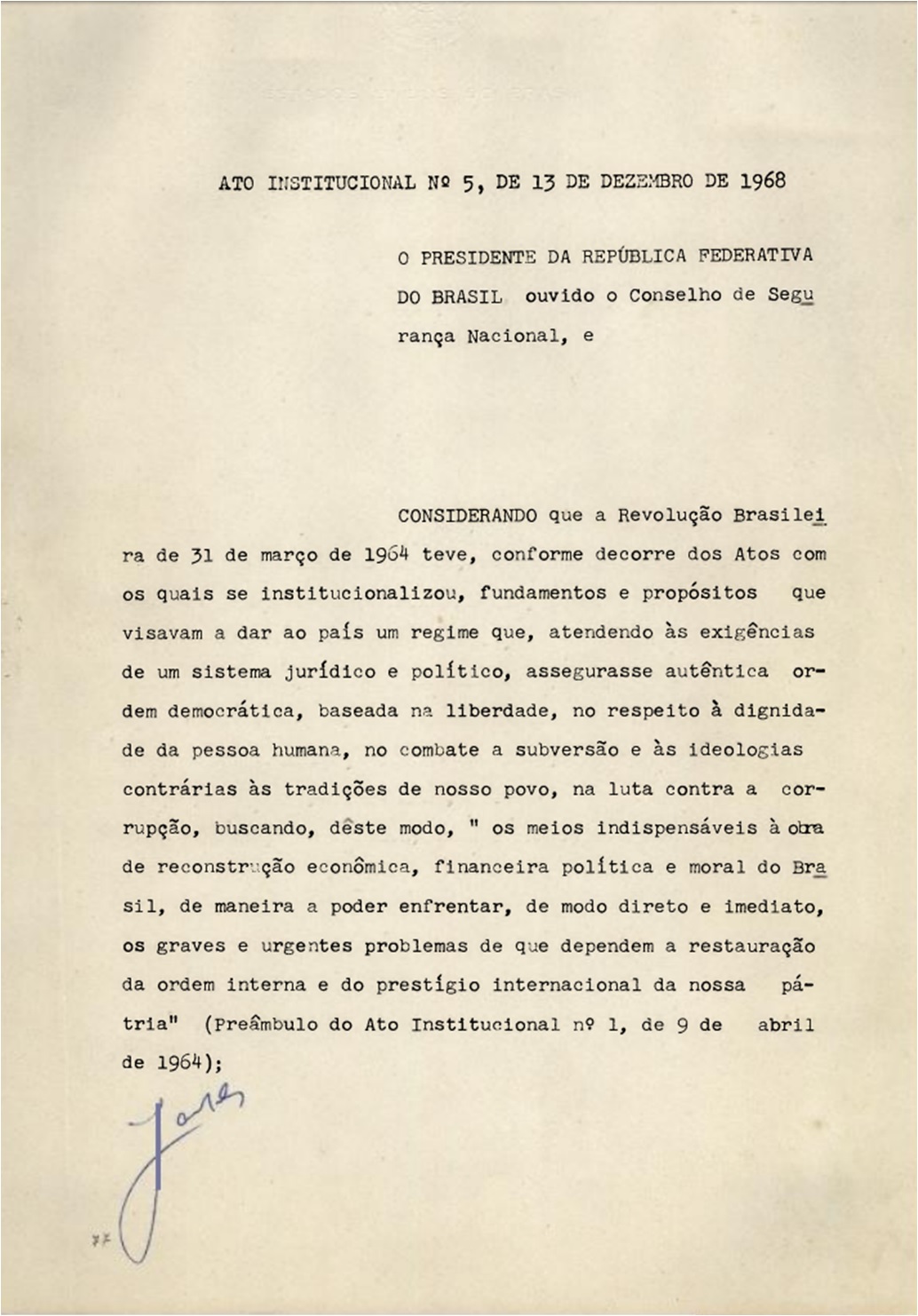Institutional Acts on:
[Wikipedia]
[Google]
[Amazon]
The Institutional Acts were extra-legal
 The military government's fifth institutional act was issued by President Artur da Costa e Silva and the National Security Council on December 13, 1968. This act suspended Congress, introduced television and radio censorship, removed ''
The military government's fifth institutional act was issued by President Artur da Costa e Silva and the National Security Council on December 13, 1968. This act suspended Congress, introduced television and radio censorship, removed ''
decrees
A decree is a legal proclamation, usually issued by a head of state, judge, royal figure, or other relevant authorities, according to certain procedures. These procedures are usually defined by the constitution, Legislative laws, or customary l ...
issued by the Brazilian military dictatorship between 1964 and 1969. The acts were not subject to judicial review
Judicial review is a process under which a government's executive, legislative, or administrative actions are subject to review by the judiciary. In a judicial review, a court may invalidate laws, acts, or governmental actions that are in ...
and superseded the 1946 constitution, serving as a vehicle for major legislative reforms that precluded the removal of the constitution.
There were 17 Institutional Acts and over 100 Complementary Acts, which elaborated on the former's general intent. The need for a comprehensive legal framework for the regime eventually led to the enactment of the 1967 constitution.
The acts were rescinded in the late 1970s during the redemocratization of Brazil.
Institutional Act no. 1 (AI-1)
The first Institutional Act, written by Francisco Campos, was issued on April 9, 1964 by the military junta and gave greater power to the Brazilian executive. These powers included the authority to amend the constitution, propose expenditure bills to Congress, suppress the political rights of citizens for ten years, and rescind the tenure of military officials and government employees. Subsequent acts such as Institutional Act no. 2 dissolved political parties and established the indirect election of the president through a congressionalElectoral College
An electoral college is a body whose task is to elect a candidate to a particular office. It is mostly used in the political context for a constitutional body that appoints the head of state or government, and sometimes the upper parliament ...
. Further acts removed direct elections of governors and city mayors.
Institutional Act no. 5 (AI-5)
 The military government's fifth institutional act was issued by President Artur da Costa e Silva and the National Security Council on December 13, 1968. This act suspended Congress, introduced television and radio censorship, removed ''
The military government's fifth institutional act was issued by President Artur da Costa e Silva and the National Security Council on December 13, 1968. This act suspended Congress, introduced television and radio censorship, removed ''habeas corpus
''Habeas corpus'' (; from Medieval Latin, ) is a legal procedure invoking the jurisdiction of a court to review the unlawful detention or imprisonment of an individual, and request the individual's custodian (usually a prison official) to ...
'' for suspects of political crimes, and gave the president control over state and local governments.
Immediately following this act, many members of Congress and Supreme Court Justices were expelled. Many politicians, professors, and dissenters were arrested or exiled, including Fernando Henrique Cardoso, who would become president in 1995 after redemocratization.
See also
* Brazilian Military Criminal CodeReferences
Further reading
* {{Military dictatorship in Brazil Brazilian legislation Emergency laws Military dictatorship in Brazil